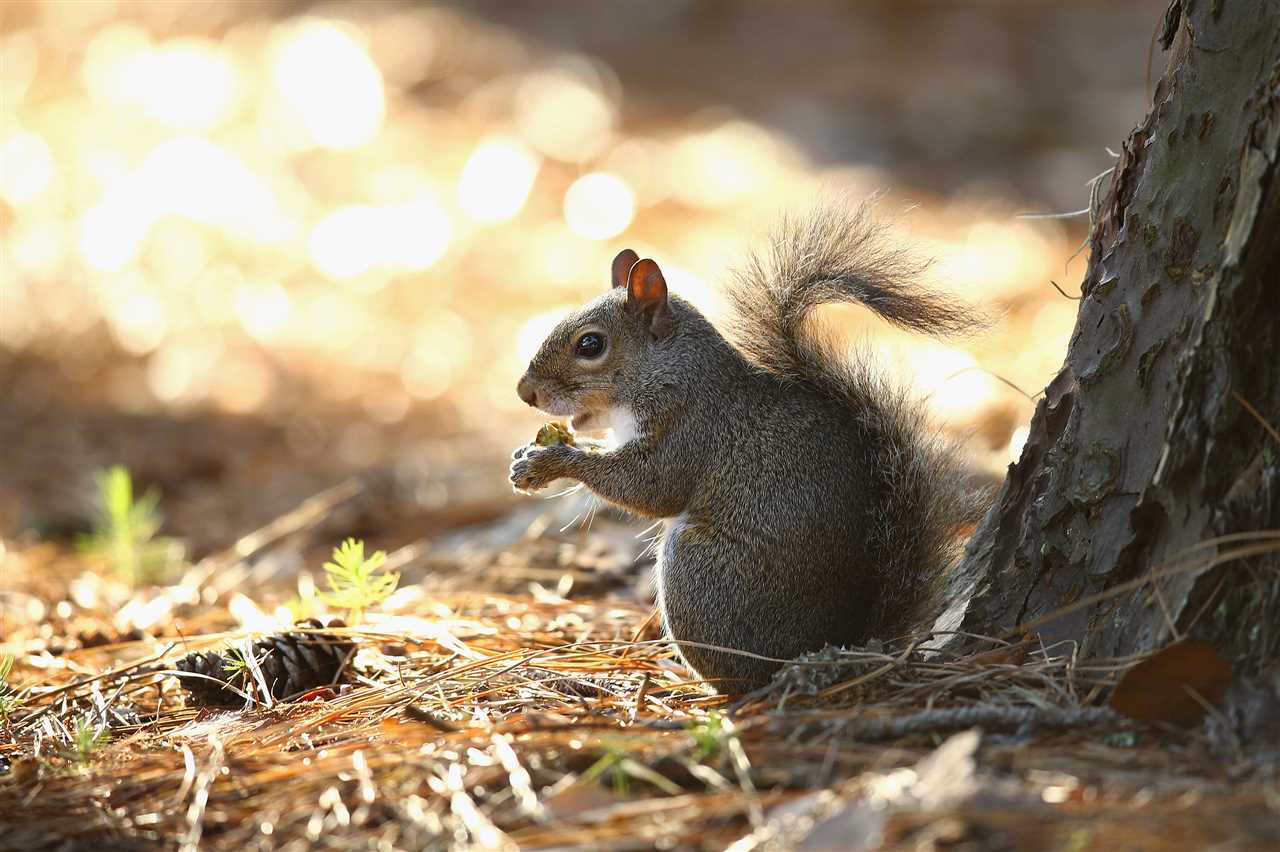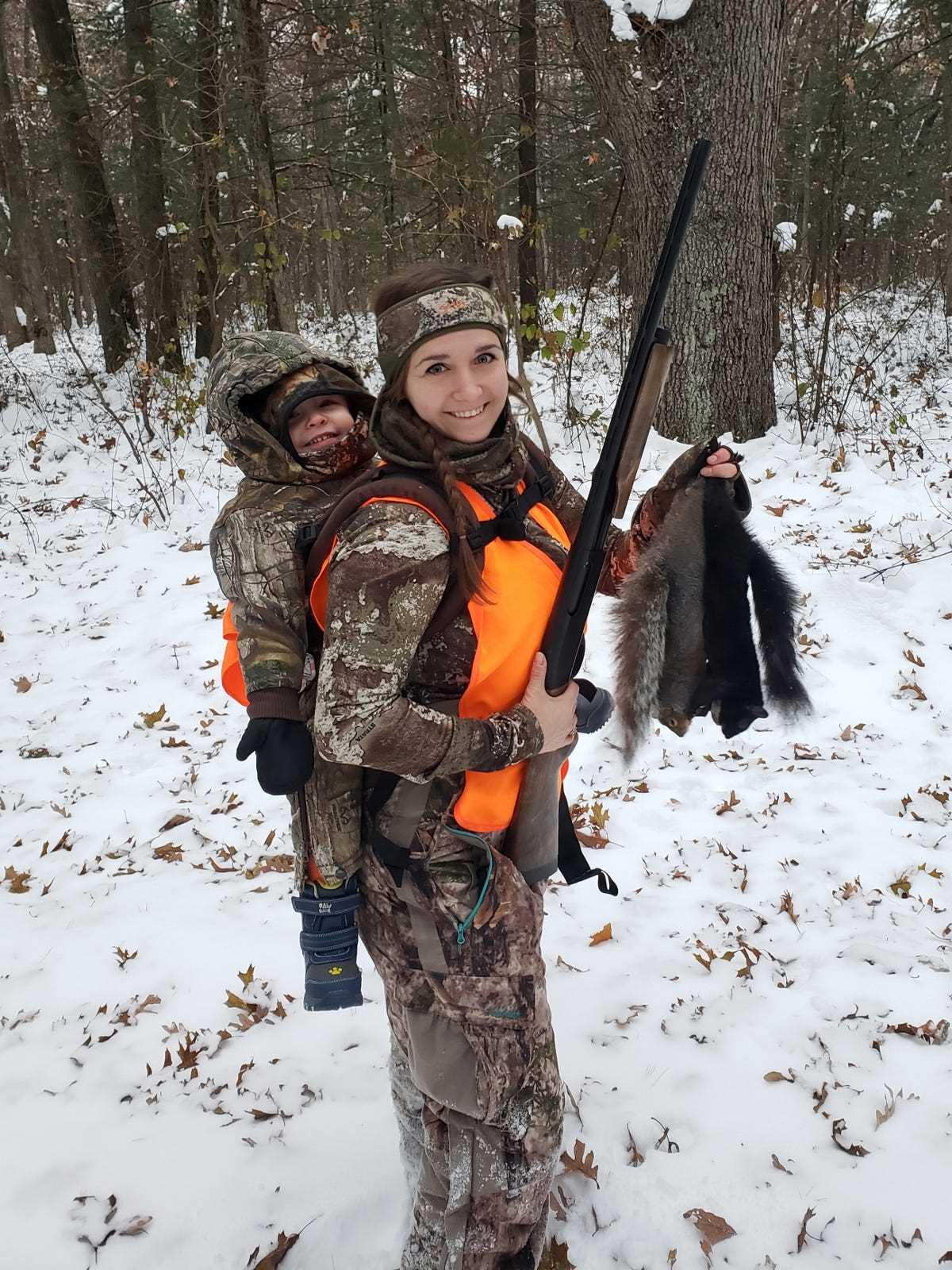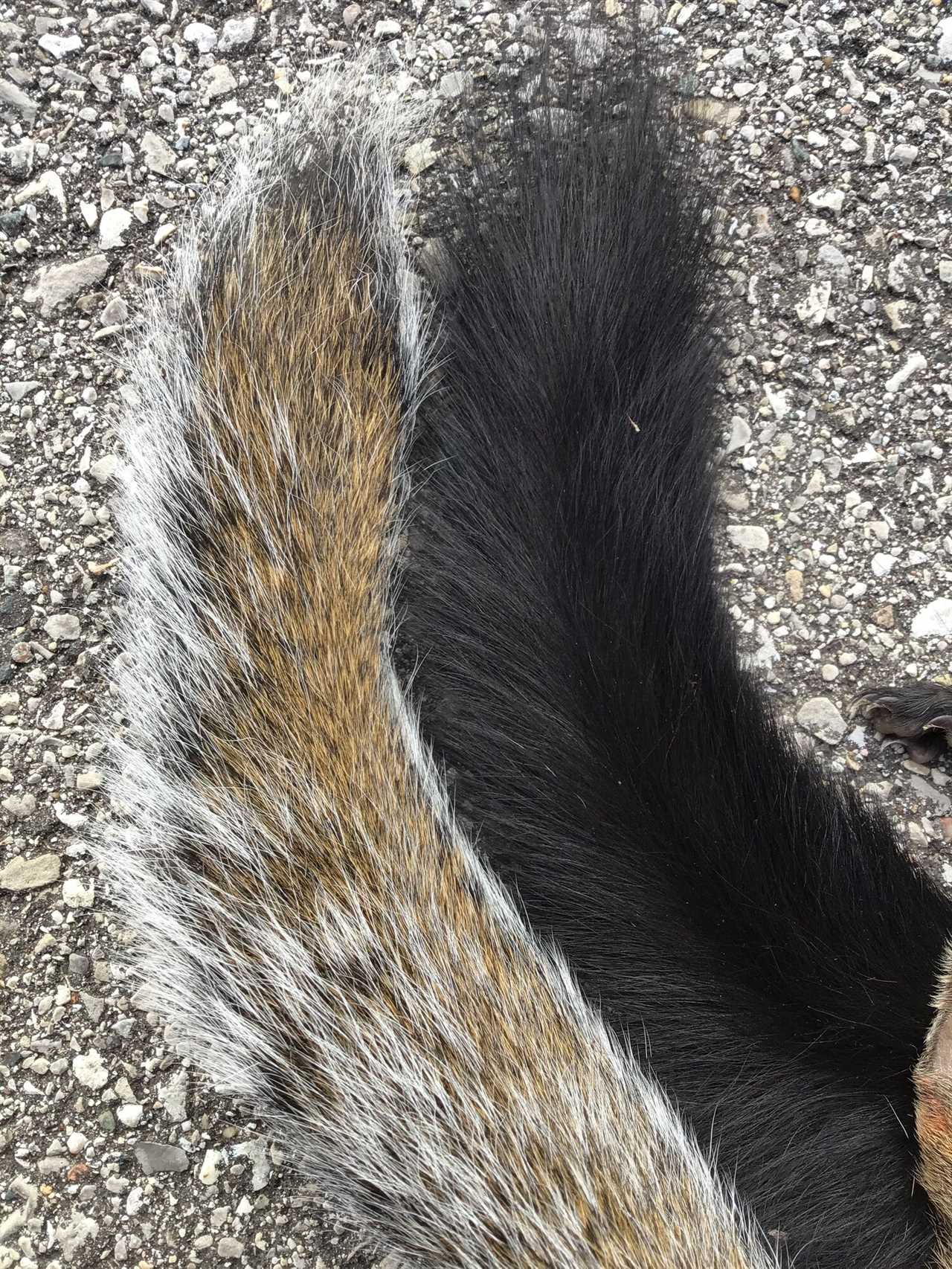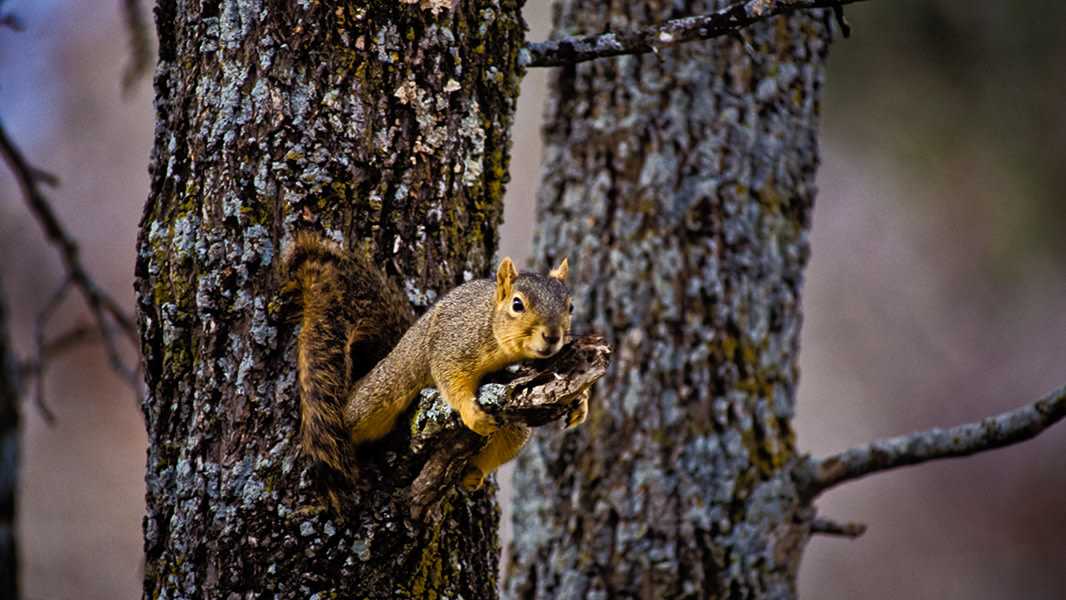Contents
Tips, regulations, and best locations for squirrel hunting in Michigan: A comprehensive guide

Squirrel hunting is a popular pastime in Michigan, attracting both experienced hunters and newcomers to the sport. With its diverse landscapes and abundant squirrel population, Michigan offers excellent opportunities for a successful hunting trip.
Before heading out into the woods, it’s important to familiarize yourself with the regulations and best practices for squirrel hunting. Michigan requires hunters to possess a valid small game license and a squirrel permit. These permits are available for purchase online or at any authorized licensing agent.
When it comes to hunting squirrels, it’s important to choose the right firearm or bow. Smaller calibers, such as .22LR rifles or .410 shotguns, are commonly used for squirrel hunting. Additionally, using a squirrel-specific call can be helpful in attracting squirrels and increasing your chances of a successful hunt.
Michigan is home to numerous public hunting areas, which provide excellent locations for squirrel hunting. State forests, wildlife management areas, and national forests offer a variety of habitats for squirrels, including dense woods, open fields, and swamps. Some of the best locations for squirrel hunting in Michigan include the Huron-Manistee National Forest, Pigeon River Country State Forest, and Waterloo State Recreation Area.
Squirrel Hunting in Michigan: Tips, Regulations, and Best Locations

Michigan offers excellent squirrel hunting opportunities for enthusiasts of all skill levels. Whether you are a beginner or an experienced hunter, squirrel hunting in Michigan can be an exciting and rewarding experience. Here are some tips, regulations, and best locations to help you make the most out of your hunting trip.
Tips:
1. Choose the right firearm: When it comes to squirrel hunting, a .22 caliber rifle is a popular choice due to its accuracy and minimal impact on the meat. Make sure to practice your shooting skills before heading out to the field.
2. Scout the area: Squirrels are most active during the early morning and late afternoon. Spend some time scouting for areas with ample food sources and signs of squirrel activity, such as chewed nuts and bark.
3. Blend into your surroundings: Squirrels have keen eyesight and can easily detect movement. Wear camouflage clothing that matches the natural environment to help you blend in and increase your chances of a successful hunt.
4. Use squirrel calls: Squirrel calls can be effective in attracting squirrels and drawing them closer to your position. Practice using different calls to mimic squirrel chatter and distress sounds to increase your chances of luring them in.
Regulations:
1. Hunting license: To hunt squirrels in Michigan, you need a small game license, which can be obtained online or at local licensing agents. Make sure to review the current hunting regulations and obtain any necessary permits.
2. Bag limits: The daily bag limit for squirrels in Michigan is set at five squirrels per hunter. It is essential to know the bag limits to ensure you stay within the legal requirements and support sustainable harvest practices.
3. Hunting season: Squirrel hunting season in Michigan typically starts on September 15 and runs until March 1. However, it is crucial to check the current hunting regulations for any changes or specific regulations for the area you plan to hunt.
Best Locations:
1. State Game Areas: Michigan has numerous state game areas that offer excellent squirrel hunting opportunities. Some popular locations include Waterloo Recreation Area, Allegan State Game Area, and Shiawassee River State Game Area.
2. National Forests: Huron-Manistee National Forest and Hiawatha National Forest are known for their abundant squirrel populations. These forests provide vast hunting grounds and beautiful natural surroundings.
3. Farmland Edges: Squirrels often utilize farmland edges to find food and cover. Look for areas where fields meet woodlands or hedgerows, as these can be productive spots for squirrel hunting.
Remember to always prioritize safety while squirrel hunting. Follow all hunting regulations, wear proper safety gear, and make sure to identify your target before taking a shot. Enjoy the adventure of squirrel hunting in Michigan and appreciate the opportunity to connect with nature.
Tips for Successful Squirrel Hunting

Squirrel hunting can be a thrilling and rewarding outdoor activity for hunters of all skill levels. To improve your chances of a successful hunt, consider the following tips:
- Know the regulations: Before heading out to hunt squirrels, it is essential to familiarize yourself with the hunting regulations in your area. Make sure you have the necessary permits and understand the limits and season dates.
- Scout your hunting location: Take the time to scout potential hunting locations ahead of time. Look for areas with abundant food sources, such as oak trees and nut-bearing trees, as these are often frequented by squirrels.
- Choose the right equipment: A smaller caliber rifle or shotgun is typically the preferred weapon for squirrel hunting. Make sure to select ammunition that is appropriate for squirrels to avoid damaging the meat.
- Practice stealth and be patient: Squirrels have excellent hearing and are very skittish. Move slowly and quietly when approaching their habitat. Take your time and wait for squirrels to come into range.
- Use squirrel calls and decoys: Squirrel calls and decoys can be effective tools for luring squirrels closer. Mimicking their vocalizations or using decoys of other squirrels can pique their curiosity and draw them in.
- Follow squirrel signs: Look for signs of squirrel activity, such as chewed nut shells or nests in trees. These signs can indicate areas where squirrels are actively feeding or residing.
- Hunt during peak times: Squirrels are most active during the early morning and late afternoon. Plan your hunting expeditions around these peak times to increase your chances of spotting and bagging squirrels.
- Be mindful of camouflage: Squirrels have keen eyesight and can spot movement from a distance. Wear camouflage clothing that matches the surrounding environment to help you blend in and stay hidden.
- Stay safe and ethical: Always prioritize safety while squirrel hunting. Be aware of your surroundings, avoid shooting at low targets, and make sure you have a clear shot. Treat the natural environment with respect and follow ethical hunting practices.
- Enjoy the experience: Squirrel hunting is not just about the harvest; it is also an opportunity to connect with nature and enjoy the outdoors. Take time to appreciate the beauty of your surroundings, even if you don’t have a successful hunt.
By following these tips, you can increase your chances of a successful squirrel hunting trip in Michigan.
Choosing the Right Gear

When it comes to squirrel hunting, having the right gear can greatly improve your chances of success. The following table lists some essential items that every squirrel hunter should have:
| Item | Description |
|---|---|
| Rifle or Shotgun | A small caliber rifle or a shotgun with the appropriate ammunition is perfect for squirrel hunting. It’s important to choose a weapon that you are comfortable with and can handle safely. |
| Ammunition | For rifles, .22 caliber ammunition is commonly used for squirrel hunting. If you prefer a shotgun, you’ll need small shot shells suitable for small game hunting. |
| Clothing | Wearing proper hunting clothing helps you blend into the surroundings and stay comfortable. Camouflage clothing is ideal for squirrel hunting as it helps you stay hidden from the keen eyesight of squirrels. |
| Boots | Sturdy boots that provide good ankle support are necessary for moving through the woods. Choose waterproof boots if you plan on hunting in wet or cold conditions. |
| Calls | Squirrel calls can be used to attract squirrels and make them curious. There are different types of calls available in the market, including distress calls to imitate the sound of a distressed squirrel. |
| Binoculars | Good quality binoculars can be helpful for spotting squirrels high up in the trees. Look for lightweight and compact binoculars that are easy to carry during your hunting trips. |
| Knife | A sharp knife is essential for field dressing squirrels after a successful hunt. Choose a knife with a sturdy blade that can easily handle the task. |
| Hunting License | Don’t forget to obtain the required hunting license before you go squirrel hunting. Make sure to check the regulations and requirements specific to the area you plan to hunt in. |
By ensuring you have the right gear before heading out for squirrel hunting, you’ll be well-prepared to have a successful and enjoyable experience in the Michigan woods.
Understanding Squirrel Behavior

When hunting squirrels in Michigan, it is important to have a good understanding of their behavior. Squirrels are small, arboreal rodents known for their quick movements and inquisitive nature. By understanding their behavior, you can increase your chances of a successful hunt.
Movement: Squirrels are agile climbers and are predominantly active during the day. They spend most of their time in trees, leaping from branch to branch with ease. Keep an eye out for squirrels scampering along the ground as well, as they may be foraging for food.
Communication: Squirrels use a combination of vocalizations and body movements to communicate with each other. They make various sounds, including chirps, squeaks, and barks, to express different emotions and warnings. Pay attention to these sounds while hunting, as they can indicate the presence of squirrels in the area.
Foraging: Squirrels have a diverse diet that includes nuts, seeds, fruits, and even small animals. During the autumn months, they are particularly active in their search for food to store for the winter. Look for squirrel activity near nut-bearing trees, such as oak and hickory, as this is where they are likely to be feeding.
Mating: Squirrels mate twice a year, in the late winter and summer. During these times, males become more active and may engage in territorial disputes. If you come across areas with signs of aggressive behavior or scent marking, it could be a good place to set up for hunting.
Habitat: Squirrels are adaptable creatures and can be found in a variety of habitats, including forests, woodlands, and urban areas. They build nests called dreys in trees, which serve as their homes and shelters. Look for squirrel nests in tree branches, as they can indicate the presence of squirrels in the vicinity.
Awareness: Squirrels have keen senses, including excellent eyesight and hearing. They are constantly scanning their surroundings for potential predators, so it’s important to move quietly and avoid making sudden movements. Use natural cover and try to blend into your surroundings to increase your chances of staying undetected.
Conclusion: To be a successful squirrel hunter in Michigan, it is crucial to understand squirrel behavior. By studying their movement, communication, foraging habits, mating patterns, preferred habitats, and their awareness of their surroundings, you can become a more effective hunter and increase your chances of a fruitful hunting experience.
Finding the Best Hunting Grounds
 Regulations for Squirrel Hunting in Michigan
Regulations for Squirrel Hunting in Michigan

When it comes to hunting squirrels in Michigan, there are several regulations that hunters need to be aware of. These regulations are in place to ensure the safety and sustainability of the squirrel population, as well as to protect the environment. Here are some key regulations for squirrel hunting in Michigan:
- Hunting Season: Squirrel hunting in Michigan is open during both the spring and fall seasons. The specific dates for each season may vary, so it is important to check the current hunting regulations before planning your hunting trip.
- Bag Limits: The bag limit for squirrels in Michigan is typically set at 5 squirrels per hunter per day. This limit helps to prevent over-harvesting and ensures that there are enough squirrels for future hunting seasons.
- Licenses: In order to hunt squirrels in Michigan, hunters must have a valid Michigan small game license. This license can be purchased online or at a local license retailer.
- Hunting Methods: Squirrel hunting in Michigan is typically done using a .22-caliber rifle or a shotgun. It is important for hunters to follow all state laws and regulations regarding firearm safety while hunting squirrels.
- Private Land: If you plan to hunt squirrels on private land in Michigan, be sure to obtain permission from the landowner before hunting. Trespassing laws are strictly enforced, and hunting without permission can result in fines or other penalties.
- Public Land: Michigan offers a variety of public lands that are open to squirrel hunting. These include state forests, wildlife management areas, and recreation areas. Be sure to familiarize yourself with any specific regulations or restrictions for the area you plan to hunt.
By following these regulations and hunting responsibly, you can enjoy a successful and enjoyable squirrel hunting experience in Michigan. Always remember to respect the environment and the animals you are hunting, and to prioritize safety at all times.
Hunting Seasons and Bag Limits

In Michigan, hunting is a popular activity for outdoor enthusiasts. The state offers various hunting seasons and bag limits to ensure sustainable wildlife management. It is important for hunters to be aware of the regulations and to follow them to promote responsible hunting practices.
The hunting seasons in Michigan vary depending on the type of game being hunted. For squirrel hunting, the season typically starts in early September and runs until the end of March. This extended season allows hunters ample opportunity to pursue squirrels throughout the year. However, it is important to note that specific hunting dates and regulations may differ based on the region, so it is advisable to check the Michigan Department of Natural Resources website for up-to-date information.
Bag limits are in place to conserve the squirrel population and maintain a healthy ecosystem. In Michigan, the bag limit for squirrels is typically five per day, with a possession limit of ten. It is crucial for hunters to accurately count and identify the squirrels they harvest to comply with these restrictions. Additionally, hunters should be aware of any specific regulations for the area they are hunting in, such as restrictions on using bait or hunting with dogs.
When planning a squirrel hunting trip in Michigan, it is important to familiarize yourself with the specific regulations and bag limits for the area you will be hunting in. This will ensure that you are hunting legally and responsibly, while also helping to preserve the squirrel population for future generations of hunters to enjoy.
Required Licenses and Permits
In the state of Michigan, hunters who wish to pursue squirrels are required to obtain the appropriate licenses and permits. It is important to ensure that you are legally allowed to hunt squirrels and to abide by all regulations set forth by the Michigan Department of Natural Resources (DNR).
First and foremost, hunters must possess a valid Michigan hunting license. This license provides individuals with the legal authority to hunt various game species, including squirrels. The hunting license can be obtained from the DNR or through an authorized license agent.
In addition to the hunting license, hunters must also have a small game license. This license specifically allows individuals to hunt small game animals, which includes squirrels. The small game license can be obtained separately or as part of a combination license package. It is important to check the expiration date of the small game license and renew it annually if necessary.
Hunters should also be aware of any specific regulations and requirements for squirrel hunting in Michigan. These may include restrictions on hunting seasons, bag limits, and the use of certain hunting methods. It is crucial to familiarize yourself with these regulations to ensure compliance and to promote ethical and responsible hunting practices.
Remember, hunting squirrels without the proper licenses and permits can result in fines, penalties, and possible loss of hunting privileges. It is always best to obtain the necessary licenses and permits and to hunt within the bounds of the law.
Key Points:
- A valid Michigan hunting license is required for squirrel hunting.
- A small game license specifically allows for hunting squirrels.
- Check expiration dates and renew licenses as needed.
- Be aware of specific regulations and requirements for squirrel hunting.
- Comply with all regulations and hunt ethically and responsibly.
By obtaining the required licenses and permits and following all regulations, you can enjoy squirrel hunting in Michigan while ensuring the sustainability of the squirrel population and the preservation of the sport for future generations.
Prohibited Methods and Weapons

In Michigan, there are certain methods and weapons that are prohibited when it comes to squirrel hunting. It is important to be aware of these regulations to ensure a safe and legal hunting experience.
Relocation Method: It is illegal to use any method that involves relocating squirrels from one area to another. This includes capturing squirrels and releasing them in a different location.
Poison: The use of poison to hunt squirrels is strictly prohibited in Michigan. This method is not only dangerous to the targeted squirrel, but it can also have unintended consequences for other wildlife and the environment.
Fully Automatic Firearms: The use of fully automatic firearms for squirrel hunting is not permitted. Only firearms that are semi-automatic or single-shot are allowed.
Traps: The use of traps is not allowed for squirrel hunting in Michigan. This includes any device or contraption designed to catch squirrels, such as snare traps or leg-hold traps.
Bow and Arrow: While bow hunting for squirrels is permitted in Michigan, the use of certain types of arrows is prohibited. It is important to use arrows that are specifically designed for small game hunting and not ones that are used for big game hunting.
It is important to familiarize yourself with these prohibited methods and weapons to ensure a safe and legal hunting experience in Michigan. Always check and follow the regulations set by the Michigan Department of Natural Resources before engaging in squirrel hunting.
Best Locations for Squirrel Hunting in Michigan

Michigan is a great state for squirrel hunting, with plentiful forests and diverse habitats that provide excellent opportunities for hunting enthusiasts. Here are some of the best locations in Michigan for squirrel hunting:
| Location | Description |
|---|---|
| 1. Manistee National Forest | The Manistee National Forest is located in northern Michigan and is known for its dense woodlands and abundance of squirrels. Hunters can find both red and gray squirrels in this area. |
| 2. Huron-Manistee National Forests | Located in the lower peninsula, the Huron-Manistee National Forests cover over one million acres of land, providing plenty of hunting opportunities. The forests offer a mix of hardwood and coniferous trees, which attract squirrels. |
| 3. Allegan State Game Area | Allegan State Game Area is located in southwest Michigan and offers over 50,000 acres of hunting grounds. The area is known for its diverse habitats, including woodlands, wetlands, and grasslands, which support a healthy squirrel population. |
| 4. Pere Marquette State Forest | Pere Marquette State Forest is located in northwest Michigan and is known for its beautiful forests and abundant wildlife. Squirrel hunters can explore the forest’s many trails and hunting areas to find their prey. |
| 5. Gladwin State Forest | Gladwin State Forest is located in central Michigan and offers over 40,000 acres of public land for hunting. The forest is home to a variety of wildlife, including squirrels, making it a popular destination for hunters. |
Before heading out to these locations, it’s important to check hunting regulations and obtain any necessary permits or licenses. Additionally, be sure to practice proper firearm safety and respect private property boundaries while hunting in Michigan.
State Forests and Wildlife Management Areas

Michigan offers a wide range of state forests and wildlife management areas that provide excellent hunting opportunities for squirrel enthusiasts. These areas are carefully managed to sustain healthy populations of squirrels and other wildlife while also providing recreational opportunities for hunters.
State forests, such as the Huron-Manistee National Forests, provide vast expanses of woodland that are ideal habitats for squirrels. These forests have a variety of tree species, including oak, hickory, and maple, which attract squirrels with their abundant food sources. Hunters can explore the forested areas and use their knowledge of squirrel behavior to locate their prey.
Wildlife management areas are another great option for squirrel hunting in Michigan. These areas are specifically designated and managed to maintain wildlife populations and provide hunting opportunities. Many wildlife management areas are located near agricultural fields or food plots, where squirrels often find ample food sources.
When hunting in state forests or wildlife management areas, it is important to be familiar with the regulations and guidelines set forth by the Michigan Department of Natural Resources. These regulations may vary depending on the specific location, so hunters should ensure they are in compliance with all applicable rules.
Before embarking on a squirrel hunting trip in Michigan, it is recommended to research specific state forests and wildlife management areas to find the best locations. Online resources, such as the Michigan Department of Natural Resources website or hunting forums, can provide valuable information on popular hunting spots and recent squirrel activity.
Overall, the state forests and wildlife management areas in Michigan offer abundant opportunities for squirrel hunting. With the right knowledge, preparation, and adherence to regulations, hunters can enjoy a successful and rewarding hunting experience in these beautiful natural settings.
National Forests and Recreation Areas

Michigan is home to several national forests and recreation areas that offer excellent squirrel hunting opportunities. These locations provide diverse habitats and ample space for hunters to explore and enjoy their sport. Here are some of the top national forests and recreation areas in Michigan for squirrel hunting:
| Forest/Recreation Area | Location | Regulations |
|---|---|---|
| Huron-Manistee National Forest | Northern Lower Peninsula | Check hunting regulations for specific rules and seasons. |
| Ottawa National Forest | Upper Peninsula | Check hunting regulations for specific rules and seasons. |
| Huron National Forest | Northeastern Lower Peninsula | Check hunting regulations for specific rules and seasons. |
| Hiawatha National Forest | Upper Peninsula | Check hunting regulations for specific rules and seasons. |
| Porcupine Mountains Wilderness State Park | Upper Peninsula | Check hunting regulations for specific rules and seasons. |
Each of these national forests and recreation areas has its own unique landscape and ecosystem, providing a variety of hunting experiences. It’s important to familiarize yourself with the specific hunting regulations for each location before heading out on your squirrel hunting adventure in Michigan. Happy hunting!
Private Land with Permission

If you have access to private land in Michigan, hunting squirrels can be a rewarding experience. However, it is essential to obtain permission from the landowner before hunting on their property. This ensures that you are following all regulations and respecting the rights of the landowner.
Once you have received permission, you can enjoy the benefits of hunting squirrels on private land. Private land often provides opportunities for a more peaceful and less crowded hunting experience compared to public hunting areas. Additionally, you may have the chance to explore different types of terrain and habitats, increasing your chances of finding squirrels.
When hunting on private land in Michigan, it is important to familiarize yourself with the specific regulations set by the Michigan Department of Natural Resources. These regulations may vary depending on the location and time of year, so be sure to stay up-to-date to ensure you are hunting within the legal bounds.
Before heading out to hunt on private land, it can be helpful to scout the area beforehand. Look for signs of squirrel activity such as nests, chewed acorns, or bark damage. This will give you a better idea of where to focus your hunting efforts.
Remember to always practice safe hunting techniques and etiquette while on private land. Be respectful of the property, follow any additional rules set by the landowner, and properly dispose of any trash or waste.
Overall, hunting squirrels on private land in Michigan can provide a unique and rewarding hunting experience. Just be sure to obtain permission, follow regulations, and show respect for the landowner and the land itself.

A skilled hunter, dedicated conservationist, and advocate for ethical practices. Respected in the hunting community, he balances human activity with environmental preservation.
